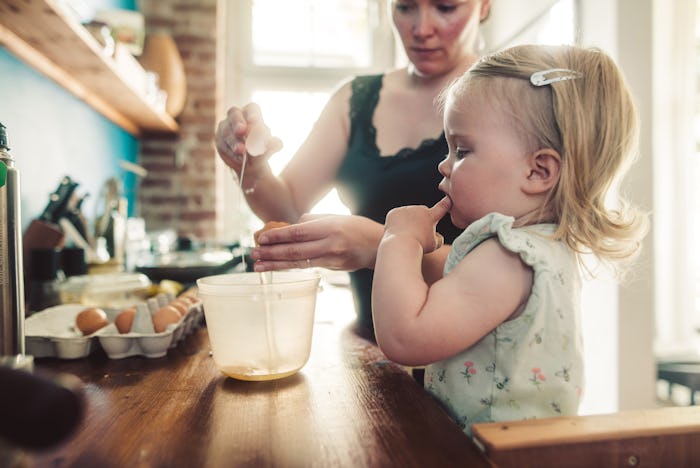Breakfast Is Served

Can Babies Eat Sunny-Side-Up Eggs?
How long do they have to avoid the beauty of a runny yolk on toast?
I love feeding my babies the same foods I’m eating. Obviously you have to alter the meal sometimes and take note of things like honey or choking hazards, but over all, most of the things I eat — especially for breakfast — are just right. But one item I’m always unsure about serving them? Runny eggs. A perfectly placed sunny-side-up egg in a piece of toast is my all-time favorite breakfast, but can babies eat runny yolks? Are they able to chow down on perfectly buttered bread dipped into a soft-boiled egg? While scrambled eggs and hard-boiled snacks are just fine, sharing a perfectly cooked sunny-side-up egg or an over-easy breakfast is kind of the best.
Can babies eat runny yolks?
One day soon you’ll be able to share a runny yolk breakfast with your babe, but if they’re under the age of 5, it’s not a good idea. Pediatrician Dr. Tanya Altmann, author of What to Feed Your Baby and Baby and Toddler Basics tells Romper that the CDC, USDA, and FDA all recommend babies and children under the age of 5 avoid raw or runny eggs due to the risk of foodborne infections, like salmonella. “Salmonella bacteria can live on or in eggs and cause a serious illness with fever, vomiting, diarrhea, and tummy pain,” Altmann shares. But if you’ve already served your baby something slightly undercooked, don’t panic. Altmann says it’s rare for salmonella to get into your child’s blood and cause more severe illness.
If you were hoping that serving up the runny yolk with a side of toast or sausage to soak up all that yellow goodness would help avoid any icky stomach issues, it’s not a solution. “Only cooking or boiling the egg, including the yolk, will kill any bacteria and make it safe for babies and young children,” Altmann says.
So should you just avoid giving your baby eggs?
On the contrary — eggs are a really important food for babies to eat. Eggs are one of the most common food allergens, and over the past few years, pediatricians and experts have recommended that parents introduce them once their baby starts eating some form of solids — the earlier, the better. “Early introduction and frequent feeding of such foods can decrease the risk of developing an allergy later on,” Altmann says. “I recommend my patients all start their infant on boiled or scrambled eggs in a form their infant can handle — such as pureed or fork-mashed cooked eggs, or small soft pieces of scrambled egg — around 6 months of age.”
Whether the eggs are for breakfast, lunch, or even a mid-day snack, it’s a great choice to serve your baby. “It’s a nutrient-dense food and provides a good source of protein and other vitamins,” Altmann says. While you may need to cook the yolk through until your child is 5, you can still enjoy giving them all types of different eggs, from fully-cooked fried eggs to cheesy scrambled eggs, and even mini omelettes or egg muffins. Eggs are cheap, fast, and can be easily customized to fit everyone’s tastes, so if serving your family eggs every single morning works for you, then it works for everyone.
Expert:
Dr. Tanya Altmann, M.D., FAAP, pediatrician and author of What to Feed Your Baby and Baby and Toddler Basics